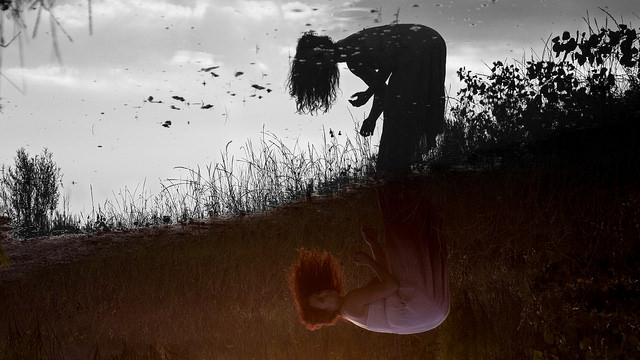Let the numb settle in.
Like a grandma, wrapping you in a heavy quilt, tea in hand, quietly whispering “everything’s alright.” The weight of the blanket sinking your chest deeper to your spine, your spine slowly settling into the cushion. Arms immobile, frozen in place.
Your body is in charge and your mind, well, your mind doesn’t seem to register.
Blank stares, wide eyes and pursed lips, you look into the dark. But it’s not so much dark, as it is grey.
Everything is grey.
The air itself has a radiance of grey.
You look on, but words don’t come. Sure you can hear them, as much as you can feel them—deep down inside—but they never come to the surface, they are smothered by the heavy quilt of numb.
The roller coaster has lulled, between the peaks and valleys you have stalled, waiting for that next climb or fall—you just are.
The funny thing about the plateau is how much everyone says how well you are doing. You’re congratulated, as if having no emotions is something to be proud of, as if this is something you’ve done yourself—something you maintain power over.
But the truth is deeper, the truth knows you aren’t in control, you simply are.
The meds, the meditation, the therapy, the everything you have been through to control this thing, this roller coaster.
This thing is your life. This thing has become as much intertwined in your whole being as your name or your skin itself, that it practically is you. In fact, at some point you wonder, who would I be without this thing?
This thing has a name but giving it a name, speaking the name gives it more power. Or does it?
You have a mental illness, you are not a mental illness.
You hear the words “you have a mental illness, you are not a mental illness” but that’s not always the case.
Anyone who has a mental illness knows, knows this isn’t the real case. It’s something people say to make you feel better but what you really need is not to separate from this thing, but to accept it.
So much of you who are, it is intertwined with the illness.
Your whole being, your whole personality is wrapped around these symptoms and your very core is a part of the thing. The thing is a part of you. It has become such a part of you, that the very idea of letting go of it, not having it any more or suffocating it with medication makes you feel akin to loosing a friend.
Even as you sit staring, knowing your non-response could be the end of a relationship—a friendship, all you is see grey. Knowing that you should react in someway—cry, shout, visibly hurt but you don’t. You look at them, in that blank stare.
The medication has won.
The illness has been squashed and sequestered until your next peak.
The peaks rise and then fall.
The higher the rise the deeper the fall. The stillness comes between.
Between the rise and fall you are “stable.” Stable means you’re not too high. Your feelings aren’t too elated, too happy or too intense. Stable means your night to low.
The world isn’t crashing, don’t stare death in the face and the thought of sleeping all day seems neither appealing nor unappealing.
You just are.
Stable.
This is what everyone wants you to be. What everyone is constantly trying to help you reach.
But, what if stable isn’t enough? No one ever dares ask. You are seen for the clinical view of bipolar, stable is the goal. “Normal” is what we strive for. A generalized, even plateau of feelings, where you neither want to go party for three days nor jumping off a moving train.
The real goal of mental illness shouldn’t be in healing or fixing what is different. The end goal should be acceptance.
Acceptance of this thing that is now a part of you, and most likely has always been a part of you. Aligning the you that you want to be with the you who has this illness.
The illness is neither a part of you nor a separate being.
You maintain the same space and you are as one. You maintain the power, in accepting that you don’t have the power.
Reaching a state of enlightenment, where you end and the illness begins, is no longer relevant.
Reaching out to change yourself, as a whole, illness and all, into the person you want to be. The strengths of your illness and the weaknesses of your body, working together to bring you closer to the earth, to your fellow humans and to the spiritual world you feel drawn to. This is the kind of stability we should seek.
You have a chemical imbalance that can be aided by medication, but even a chemical imbalance benefits from a changed mental focus, an attuning of your heart.
It is my wish that the medical world would work more closely with the spiritual healers to reach a whole approach to treating illnesses of the mind.
Relephant:
Mental Illness is an A**hole.
Author: Rachel Taculad
Apprentice Editor: Bria Luu/ Editor: Ashleigh Hitchcock
Photo: flickr









Read 0 comments and reply